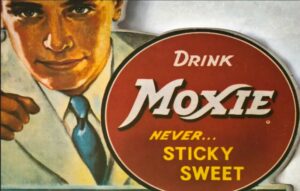By Sharon Oliver
Contributing Writer
REGION – At least “what this country needs is plenty of Moxie” is how the company felt during World War II, hence the slogan. Augustin Thompson, a homeopathic physician, created the soft drink Moxie in Lowell in 1876 and it was initially billed as “Moxie Nerve Food.” At the time, Lowell was home to the world’s largest patent medicine factory, Ayer Drug Company. By 1920, Moxie had outsold its competitor, the soda giant Coca-Cola, thanks to taste and advertising budget.
Boston start
Thompson was a native of Union, Maine but first bottled his product at 74 Heath Street in the Jamaica Plain section of Boston. The building would eventually become known as Moxieland. Thompson set out to create a “cure-all” tonic using a secret ingredient later identified as gentian root extract. Gentian root has been used as a health supplement since 170 B.C. and is touted as a beneficial aid for indigestion. Moxie was marketed as a medical cure for ailments such as “nervous exhaustion, imbecility, restoration of mental acuity, and loss of manhood.” Bartenders would serve it to patrons who were too drunk to be given any more alcohol.

The drink was advertised as a “nerve food” that strengthens the nervous system, was “very healthful” and a “drink for athletes.” However, Thompson added soda water to his concoction after the market for patent medicines began to decline. Movie stars promoted Moxie during its heyday in the 1920s. President Calvin Coolidge was known to be a fan of the root beer-like soda since childhood and often paired it with his favorite midnight snack of cold pizza topped with black olives. Perhaps a suitable alternative to alcohol among D.C.’s social elite, Moxie was at its peak during Prohibition.
As for the name and unlike most words, moxie is not derived from Greek or Latin roots. Thompson attributed the name to an alleged friend, Lieutenant Moxie but the moniker likely originated from the Native American Abenaki word for dark water. It is also slang for words like spunk, spirit, guts, courage, or energy and was first coined around 1930.
Celebrity endorsement
Boston Red Sox slugger Ted Williams endorsed the drink by appearing in a series of print and radio ads that position Moxie as the baseball icon’s liquid choice to recharge between games. Williams even lent his voice to lyrics like: “Pop a Moxie, you’re back in the game!
Take tiredness out of your name!” Moxie Beverage Company scored a home run in sales due to the campaign and in what are now vintage print ads. The company also marketed a beverage called Ted’s Root Beer. The creamy root beer was bottled in Needham and any original bottle found would be a rare collector’s item. There were reproductions made in the 1980s featuring the “Splendid Splinter” on the label.
Augustin’s son Francis Thompson lived on Pleasant Street in Arlington and was president of the company from 1904 until he died in 1939. Before his death, Francis and his wife financed scholarships for Arlington High School graduates each year.
Love it or hate it
Moxie is one of those drinks that folks either love or hate because of its robust flavor. Its long-time tagline is “Distinctively Different” and that’s probably something that anyone who has tasted it can agree is true. For those who love and miss the taste that only Moxie can offer, it’s still widely distributed in the New England area, but to a lesser extent elsewhere. Of course, online shopping can solve that problem.
On August 28, 2018, the Coca-Cola Company announced it would be buying Moxie with a promise to not tinker with its unique taste. The oldest continuously produced soft drink in the United States, now under the ownership of its former competitor, is still going strong and even comes in a diet version with zero calories as well.
RELATED CONTENT:
Cape Cod Chips put Massachusetts on the snack food map
‘Sam Adams’ founder Jim Koch bet on craft beer and won












